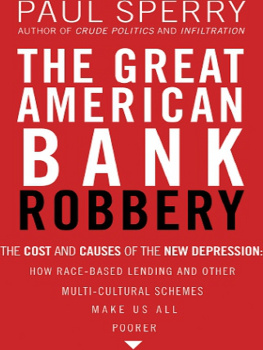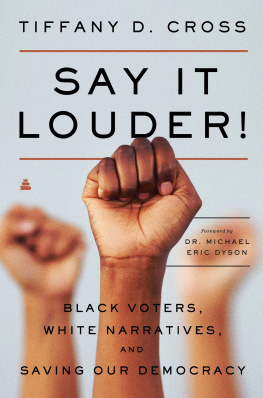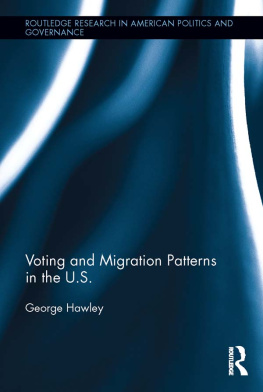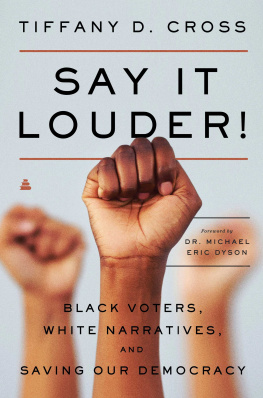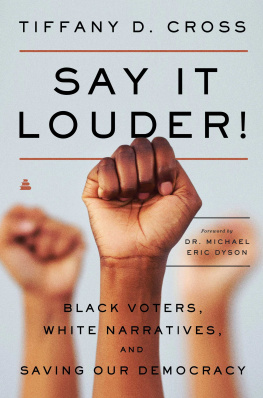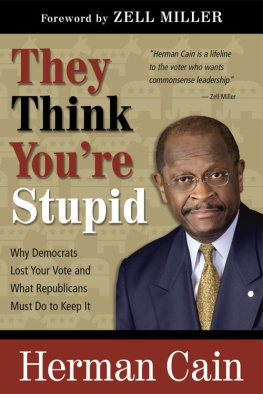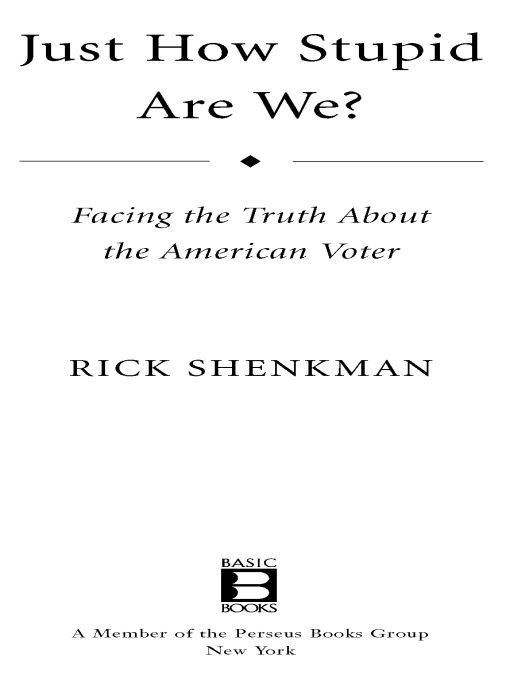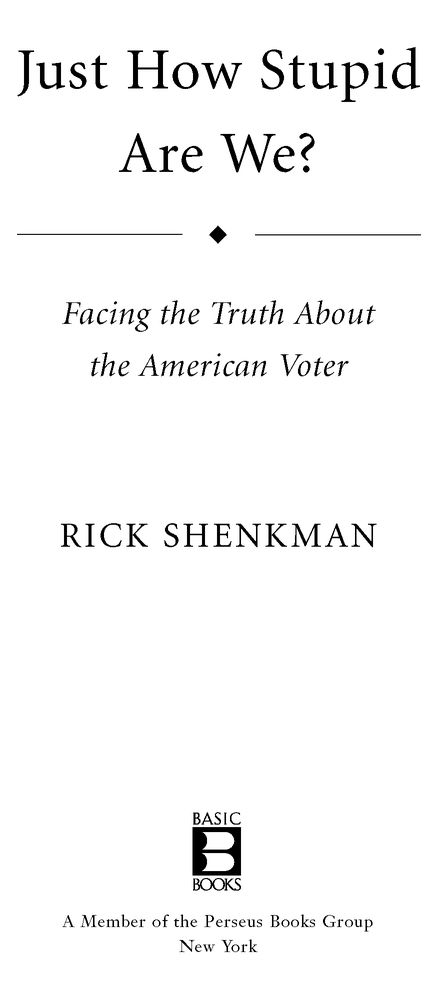Table of Contents
Praise for Rick Shenkmans
Just How Stupid Are We?
What Shenkman does not do is chortle, Mencken-like, about stupidity. He offers plausible suggestions for how the knowledge level of the American electorate might be raised to a respectable threshold.
Newsweek.com
Shenkman combines his talents as a reporter and a historian to assess why the American voter can be rational and yet so capable of being played like a fiddle by politicians... highly recommended.
Library Journal
In lucid, playful prose... Shenkman initiates an important conversation in this book and makes welcome suggestions to reinvigorate civic responsibility and provide people with the knowledge and tools necessary to efficaciously participate in the political process.
Publishers Weekly
With wit, passion and devastating evidence, Shenkman compels us, the praised and petted American people, to look in the mirror for an explanation of why our elections are travesties of informed, intelligent debate. Lively and crucial, the book reminds us, however we vote, that theres no such animal as democracy for dummies.
BERNARD A. WEISBERGER, author of America Afire
The bad news is that Americans are ignorant, short-sighted, and swayed by meaningless phrases; the good news is that things could get betterif we start speaking honestly about the problem. Rick Shenkmans book is a crucial starting point in that process.
JON WIENER, Professor of History at University of California at Irvine and author of Historians in Trouble
Are manipulative politicians and an intimidated media the only reasons weve had to suffer through the Bush years? What about the American people? Why dont they stop, pay attention, and think for themselves? In his candid and hard-hitting history of American political culture, Shenkman offers a compelling and disturbing analysis of the American people and why we get the government we deserve.
RUTH ROSEN, Professor Emerita of History,
University of California, Davis
FOR JOHN STUCKY
MAGGIE: Truth! Truth! Everybody keeps hollerin about the truth. Well, the truth is as dirty as lies.
BRICK: Can you face the truth... ?
BIG DADDY: Try me!
BRICK: You or somebody elses truth?
BIG DADDY: Bull. Youre runnin again.
BRICK: Yeah, I am runnin. Runnin from lies, lies like birthday congratulations and many happy returns of the day when there wont be any.
Cat on a Hot Tin Roof
Authors Note
After The Bad Bush Years there is a deep yearning in America for change. Many of us cannot wait for the headline: George W. Bush Leaves Office. Along with millions of Americans, throngs around the world will no doubt cheer the news of his departure, as will I.
But as the reader will see, I am convinced that it is too easy to blame our mess on Mr. Bush. And I do not believe that his replacement by a leader who is less partisan and more competent and sensitive to civil liberties will begin to remedy what ails us.
What went wrong, went wrong long before Mr. Bushs ascendancy. His flaws simply gave us the unwelcome opportunity of seeing what heretofore had remained largely invisible.
We have had enough books about Mr. Bush, and I, for one, frankly am tired of them. What we need now are books to help us understand us. What has happened did not happen as a result of a single leaders mistakes. We had a hand in it.
The clich is that people get the government they deserve. If thats true, why did we deserve Mr. Bush?
That is the question I set out to answer.
RICK SHENKMAN
Seattle
The Problem
The great enemy of the truth is very often not the liedeliberate, contrived, and dishonest, but the mythpersistent, persuasive, and unrealistic. Belief in myths allows the comfort of opinion without the discomfort of thought.
JOHN F. KENNEDY
Are Americas voters prepared to shoulder the responsibility of running the most powerful nation on earth? Do a majority know enough? Care enough? Think hard and clearly enough?
A sign of our self-confidence as a people is that we regularly call attention to the dumb things our politicians say and do. But who takes the voters to task for their foolishness? Any dolt can make fun of a politician. What if the real problem isnt with them but with usor, to be more precise, those among us who exhibit habitual stupidity?
To be blunt: We are, it seems to me, guilty of a certain kind of cowardice for our failure to inquire deeply into the mistakes the voters make. Even after 9/11, when fresh thinking was needed most, we neglected as a society to confront harsh truths about the limits of the publics wisdom. Busy spreading democracy around the world, we refused to reflect bravely on the defects of our own. Instead of admitting our flaws, we settled, somewhat defensively, on the myth that we are a good and great people with noble aims.
The willingness to address our myths calls for a certain amount of courage. The thesis of this book is that courage of the sort we need has been in short supply of late. We have allowed the myth of The People to warp our politics, limit the choices of our leaders, and hinder us in our war with Islamist terrorists, putting our democracy, and possibly even our lives, in danger. While pundits on both the Left and the Right have advanced vigorous arguments about a seemingly endless number of hot topics, they have largely ignored how the voters limitations have sabotaged us time and again. One of the purposes of this book is to provide various ways to have a constructive conversation about this most sensitive of subjects.
Presumably most Americans would agree that honesty and clear-headedness are desirable. So why has it been so difficult for us to achieve these twin goals? The conclusion I have reached is that we may not truly desire the truth, however sincerely we believe that we do. The record of our history suggests that, given a choice between a harsh truth and a comforting myth, we have been inclined to embrace the latter.
We flatter ourselves that we are, in the wake of 9/11, a serious peopleor, at any rate, a more serious people than formerly. But seriousness surely means, if it means anything, the willingness to face facts, even those facts that may give us a bad case of indigestion. And this, as we shall see, we have not been willing to do.
Our problem is twofold. Not only are we often blind to the faults of the voters, owing to the myth of The People, but the voters themselves frequently base their opinions on myths. This is a terrible conundrum. Democracy is rooted in the assumption that we are creatures of reason. If instead, as seems likely, we human beings are hard-wired to mythologize events and our own history, we are left with the paradox that our confidence in democracy rests on a myth.
Of all our myths, I believe the myth of The People to be the most dangerous one confronting us at present. The evidence of the last few years that millions are grossly ignorant of the basic facts involving the most important issues we face has brought me to this sad conclusion. As became irrefutably clear in scientific polls undertaken after 9/11 by the Program on International Policy Attitudes (PIPA), millions of Americans simply cannot fathom the twists and turns that complicated debates take.


